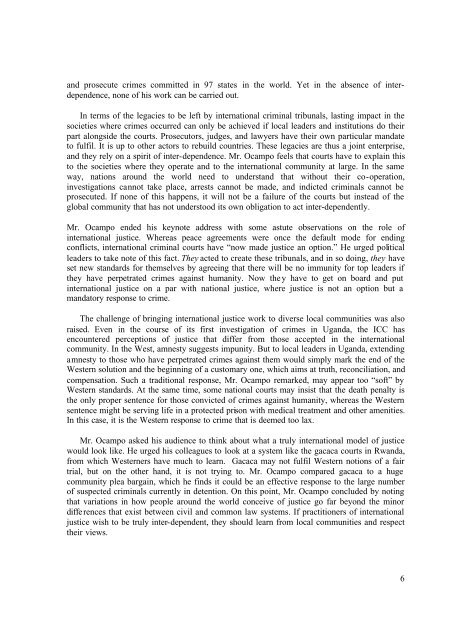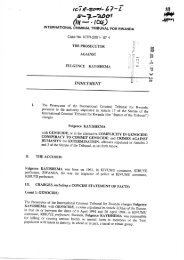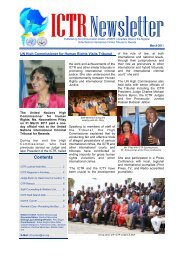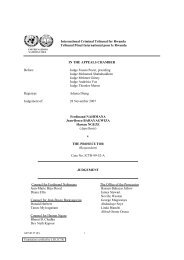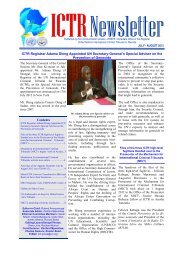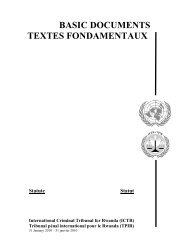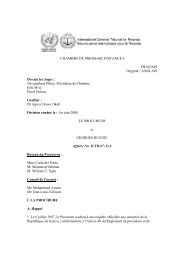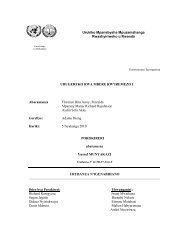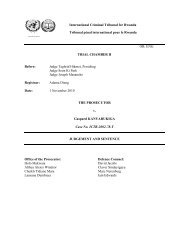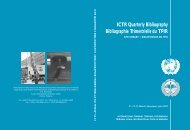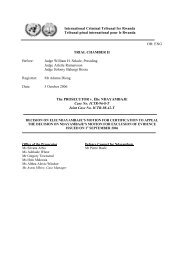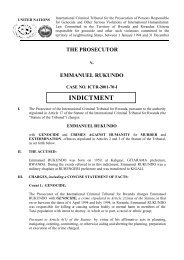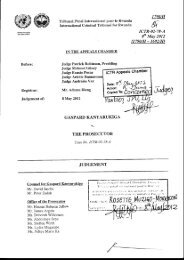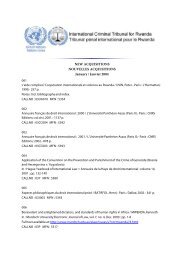Report of Proceedings - International Criminal Tribunal for Rwanda
Report of Proceedings - International Criminal Tribunal for Rwanda
Report of Proceedings - International Criminal Tribunal for Rwanda
You also want an ePaper? Increase the reach of your titles
YUMPU automatically turns print PDFs into web optimized ePapers that Google loves.
and prosecute crimes committed in 97 states in the world. Yet in the absence <strong>of</strong> interdependence,<br />
none <strong>of</strong> his work can be carried out.<br />
In terms <strong>of</strong> the legacies to be left by international criminal tribunals, lasting impact in the<br />
societies where crimes occurred can only be achieved if local leaders and institutions do their<br />
part alongside the courts. Prosecutors, judges, and lawyers have their own particular mandate<br />
to fulfil. It is up to other actors to rebuild countries. These legacies are thus a joint enterprise,<br />
and they rely on a spirit <strong>of</strong> inter-dependence. Mr. Ocampo feels that courts have to explain this<br />
to the societies where they operate and to the international community at large. In the same<br />
way, nations around the world need to understand that without their co-operation,<br />
investigations cannot take place, arrests cannot be made, and indicted criminals cannot be<br />
prosecuted. If none <strong>of</strong> this happens, it will not be a failure <strong>of</strong> the courts but instead <strong>of</strong> the<br />
global community that has not understood its own obligation to act inter-dependently.<br />
Mr. Ocampo ended his keynote address with some astute observations on the role <strong>of</strong><br />
international justice. Whereas peace agreements were once the default mode <strong>for</strong> ending<br />
conflicts, international criminal courts have “now made justice an option.” He urged political<br />
leaders to take note <strong>of</strong> this fact. They acted to create these tribunals, and in so doing, they have<br />
set new standards <strong>for</strong> themselves by agreeing that there will be no immunity <strong>for</strong> top leaders if<br />
they have perpetrated crimes against humanity. Now the y have to get on board and put<br />
international justice on a par with national justice, where justice is not an option but a<br />
mandatory response to crime.<br />
The challenge <strong>of</strong> bringing international justice work to diverse local communities was also<br />
raised. Even in the course <strong>of</strong> its first investigation <strong>of</strong> crimes in Uganda, the ICC has<br />
encountered perceptions <strong>of</strong> justice that differ from those accepted in the international<br />
community. In the West, amnesty suggests impunity. But to local leaders in Uganda, extending<br />
amnesty to those who have perpetrated crimes against them would simply mark the end <strong>of</strong> the<br />
Western solution and the beginning <strong>of</strong> a customary one, which aims at truth, reconciliation, and<br />
compensation. Such a traditional response, Mr. Ocampo remarked, may appear too “s<strong>of</strong>t” by<br />
Western standards. At the same time, some national courts may insist that the death penalty is<br />
the only proper sentence <strong>for</strong> those convicted <strong>of</strong> crimes against humanity, whereas the Western<br />
sentence might be serving life in a protected prison with medical treatment and other amenities.<br />
In this case, it is the Western response to crime that is deemed too lax.<br />
Mr. Ocampo asked his audience to think about what a truly international model <strong>of</strong> justice<br />
would look like. He urged his colleagues to look at a system like the gacaca courts in <strong>Rwanda</strong>,<br />
from which Westerners have much to learn. Gacaca may not fulfil Western notions <strong>of</strong> a fair<br />
trial, but on the other hand, it is not trying to. Mr. Ocampo compared gacaca to a huge<br />
community plea bargain, which he finds it could be an effective response to the large number<br />
<strong>of</strong> suspected criminals currently in detention. On this point, Mr. Ocampo concluded by noting<br />
that variations in how people around the world conceive <strong>of</strong> justice go far beyond the minor<br />
differences that exist between civil and common law systems. If practitioners <strong>of</strong> international<br />
justice wish to be truly inter-dependent, they should learn from local communities and respect<br />
their views.<br />
6


